
- Home
- India
- World
- Premium
- THE FEDERAL SPECIAL
- Analysis
- States
- Perspective
- Videos
- Sports
- Education
- Entertainment
- Elections
- Features
- Health
- Business
- Series
- In memoriam: Sheikh Mujibur Rahman
- Bishnoi's Men
- NEET TANGLE
- Economy Series
- Earth Day
- Kashmir’s Frozen Turbulence
- India@75
- The legend of Ramjanmabhoomi
- Liberalisation@30
- How to tame a dragon
- Celebrating biodiversity
- Farm Matters
- 50 days of solitude
- Bringing Migrants Home
- Budget 2020
- Jharkhand Votes
- The Federal Investigates
- The Federal Impact
- Vanishing Sand
- Gandhi @ 150
- Andhra Today
- Field report
- Operation Gulmarg
- Pandemic @1 Mn in India
- The Federal Year-End
- The Zero Year
- Science
- Brand studio
- Newsletter
- Elections 2024
- Events
Why a Chhattisgarh village is standing guard 24*7 against its Odia neighbours

On an overcast afternoon, oblivious of the characteristic cacophony and commotion of the election season that has gripped the rest of Chhattisgarh, Domu Kashyap and his comrades stand guard on the border of their village deep inside the Sal forest of Bastar; a routine they follow round the clock, each day of the year.To the unversed, the fact that Domu’s village, Machkot, is in Bastar...
On an overcast afternoon, oblivious of the characteristic cacophony and commotion of the election season that has gripped the rest of Chhattisgarh, Domu Kashyap and his comrades stand guard on the border of their village deep inside the Sal forest of Bastar; a routine they follow round the clock, each day of the year.
To the unversed, the fact that Domu’s village, Machkot, is in Bastar may immediately trigger one of two guesses about what it is that this band of 20 villagers, armed with axes, slingshots or sickles tied to one end of a stick, are standing guard against. The ‘right answer’, though, isn’t the danger from Naxalites in this region infamous for Left Wing Extremism (LWE) nor are they guarding their village against a stray tiger or leopard on prowl in the dense forests.
Domu heads the van prabandhan samiti (forest management committee) of Machkot and along with 19 other men of his village, his self-designated task is to protect the forest and its produce against “Odia poachers and thieves”.
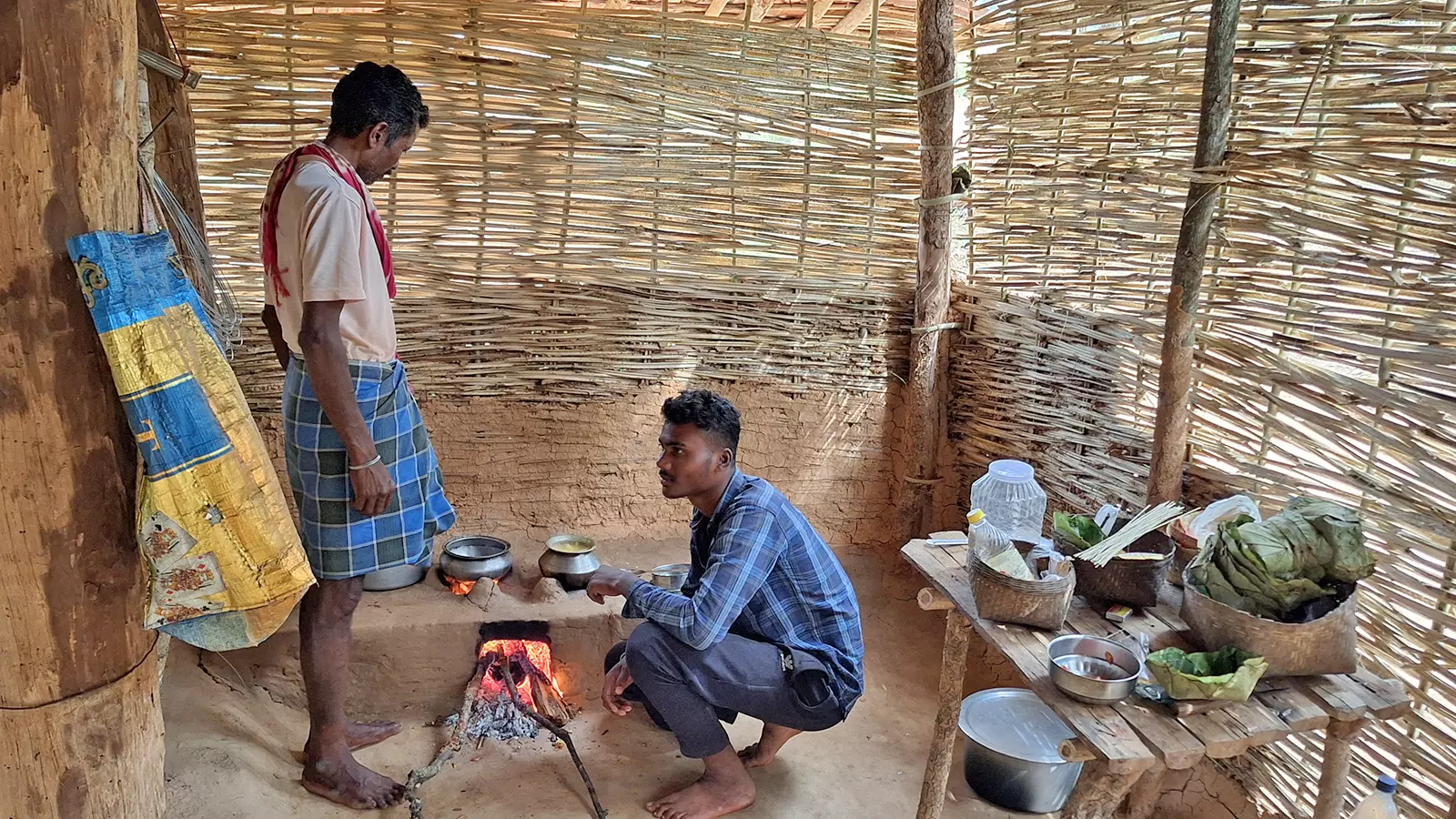
Members of the van prabandhan samiti prepare a meal at their hut on the Machkot-Machamal border. Photo: Puneet Nicholas Yadav
A tiny hamlet of 59 houses and a population of 278 people — all of them Dhruva tribals, except one family of five from the backward caste Yadav community — Machkot is the last village of Bastar town on Chhattisgarh’s border with Odisha’s Koraput district. A fence of concertina wires erected by Domu’s van prabandhan samiti with financial aid provided by the state’s forest department separates Machkot from Machamal, the village on the Koraput side.
There is a single opening along the fence to allow villagers from either side to move between Machkot and Machamal. The kachchi sadak is not for regular vehicular traffic. There is no traffic police or chungi (barrier) here to collect road tax. Barring Sandeep, the lone forest ranger deputed at Machkot, there is no sign here of any government oversight for movement on this inter-state border, though, on occasion, someone from the Chhattisgarh police visits for a recce.
What is most striking about this border is not Domu and his men standing guard with their crude home-made weapons but the stark difference in the landscape between the two adjoining villages. The Machkot side has a lush Sal forest that begins as soon as the first half of the village, with its fields of maize and paddy, houses of the locals and a cemented road, gives way to the kilometre-long kachchi sadak. Then, all signs of the wild disappear the moment one steps foot into Machamal, which resembles a seemingly infinite patch of agricultural land.
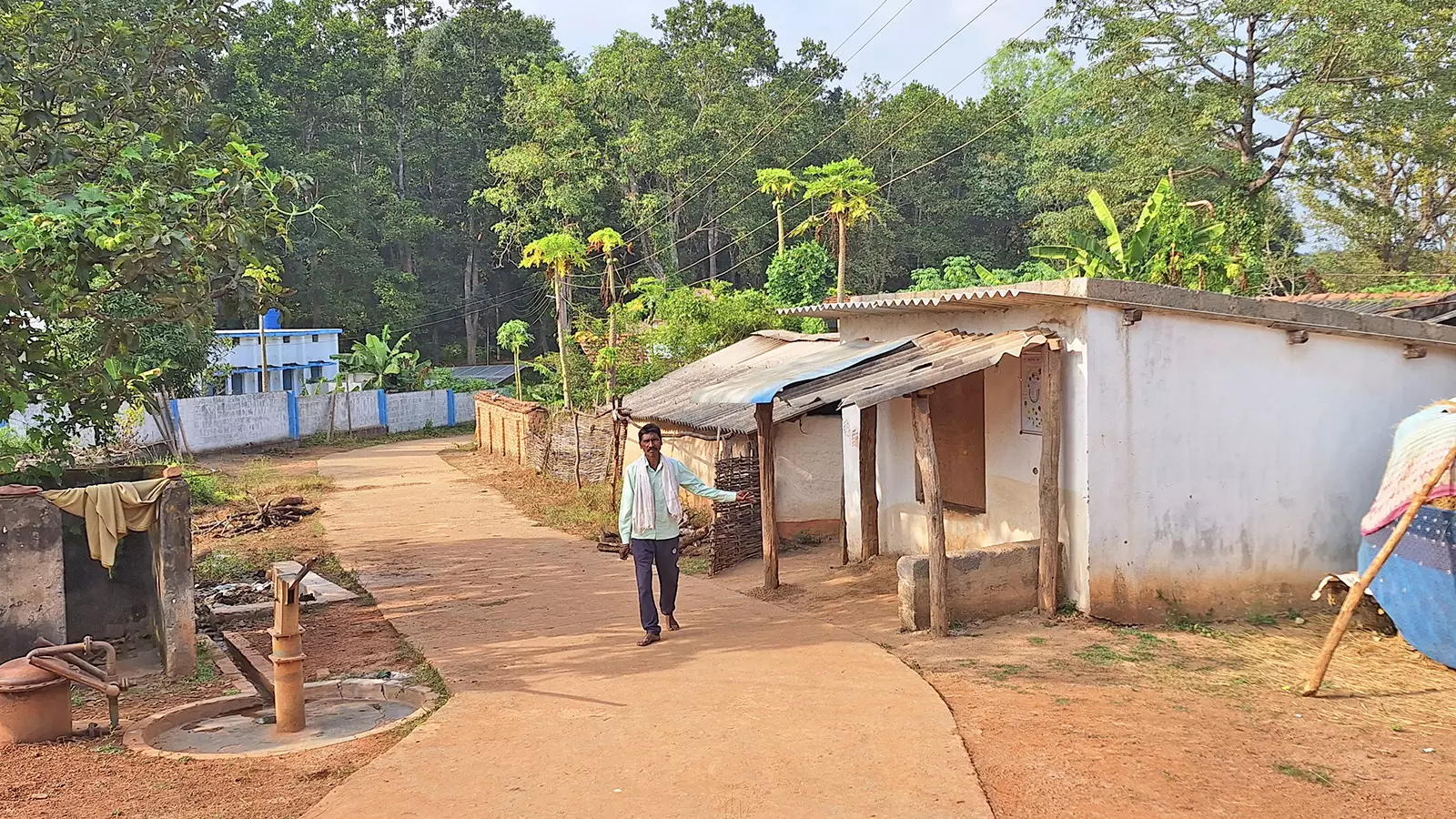
Domu Kashyap in Machkot village. Domu heads the van prabandhan samiti. Photo: Puneet Nicholas Yadav
It is this contrast between Machkot and Machamal that Domu says is the reason for his band of brothers standing guard all year long, at the border.
“The Odia people have cut their forests completely while we have cleared just enough forest land to sow crops that would sustain our population and give us a little extra to sell in the market for our financial needs. Now, those people (from Machamal and beyond) try to come into our forest to steal timber and other forest produce. When they come to this side, there are violent clashes as we try to chase them away,” Domu told The Federal.
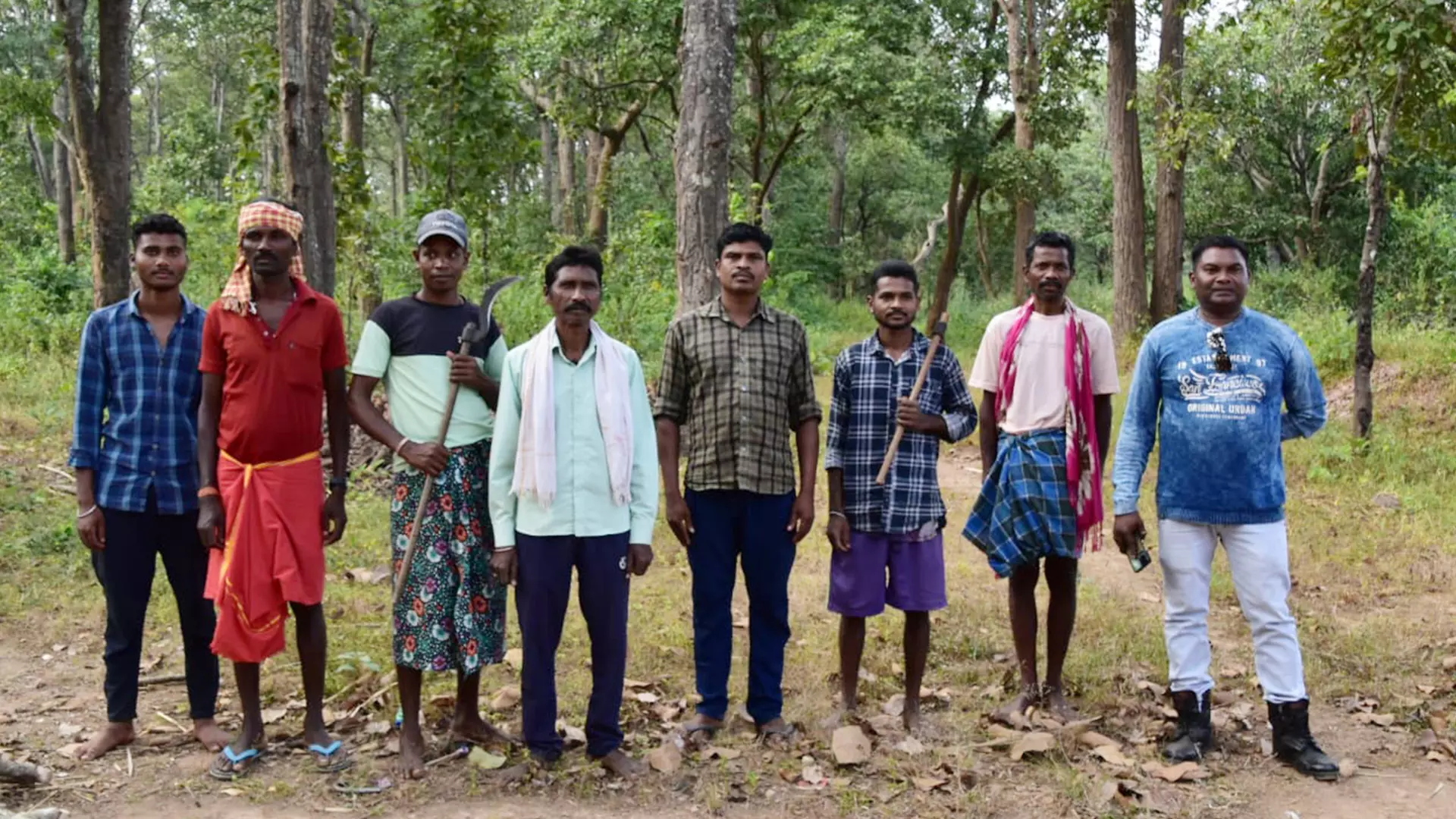
Domu Kashyap with members of the van prabandhan samiti. Photo: Himanshu Joshi
Given that the border requires round the clock patrolling, the van prabandhan samiti has erected a small wooden hut right next to the concertina fence where a bunch of Domu’s comrades can keep their weapons, make their meals and, if all’s calm, catch forty winks. There are no toilets and the guards simply “go behind the trees” when nature calls. Isn’t that dangerous given that the forest, according to Sandeep, has “five or six bears, plenty of dhols (wild dogs), jackals” and a “leopard that has strayed in from somewhere over the past month”. In the late 1990s, Machkot had also lost over a dozen of its residents to a streak of tigers. A long-drawn operation by the forest department had then trapped four adult tigers and two cubs from these woods and translocated them to the Bandhavgarh National Park (Chhattisgarh, at the time, was part of Madhya Pradesh).
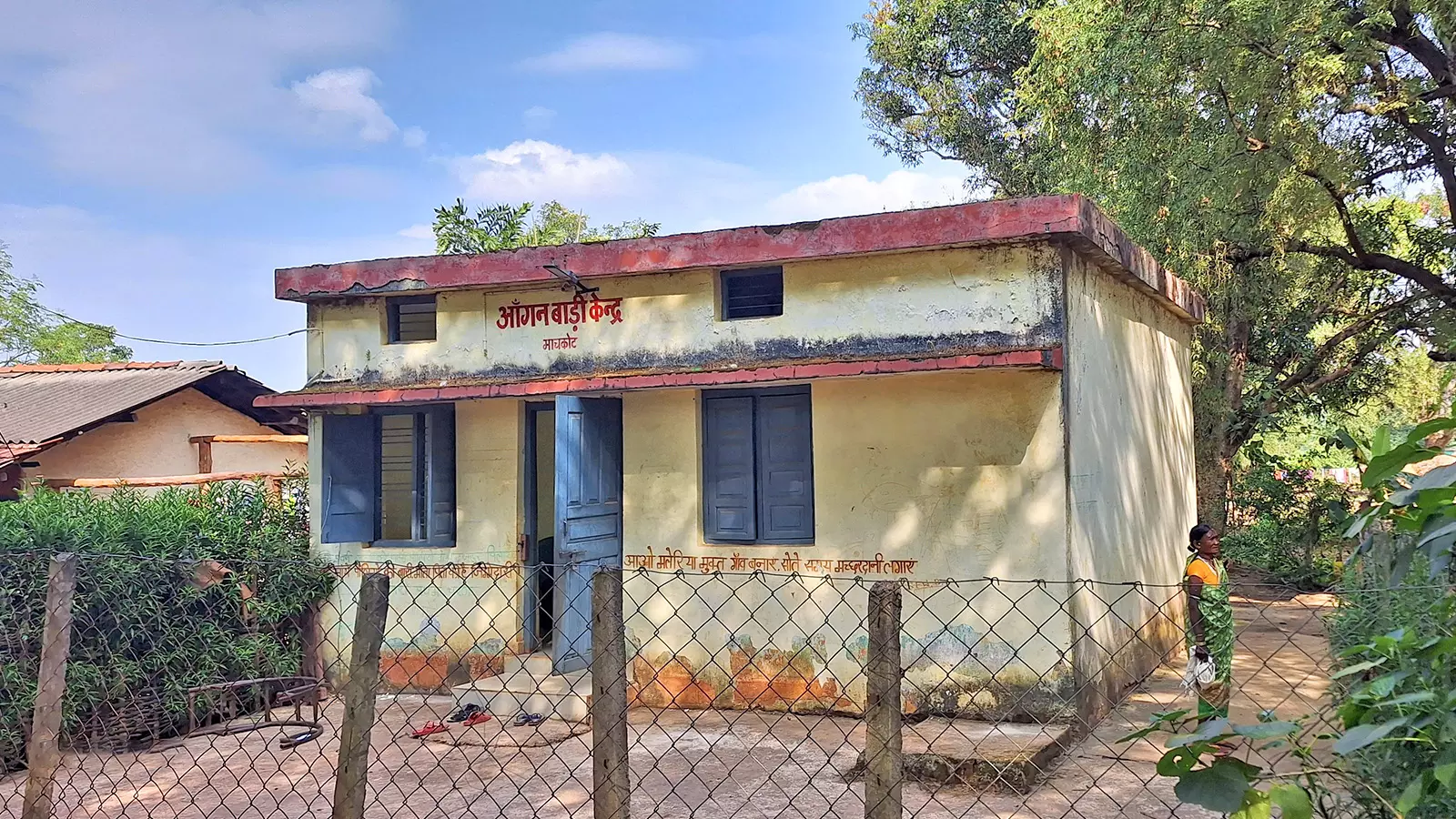
The Anganwadi centre in Machkot. Photo: Puneet Nicholas Yadav
“We don’t fear the wild animals here and Naxals also don’t come to this side but we stay alert. The tigers are gone. There are bears but they don’t harm us; at times they come near the hut, roam around for a while and go back into the jungle,” says Kamlu, another member of the van prabandhan samiti. With an impish tone, Domu adds, “There’s one leopard that has wandered in recently but he doesn’t know this forest as well as we do.”
Over time, the group has also mastered the art of reconnaissance and even espionage against their Odia rivals. “We have good terms with the people in Machamal and we convinced some of them to keep us informed of the activities of the timber mafia and thieves coming from that side. We learned their language too because though our villages are connected, our languages are completely different and so, initially, if some of their men were roaming around the fence and talking among themselves, we wouldn’t understand what they were saying and if they were plotting to do something on our side,” Domu says.
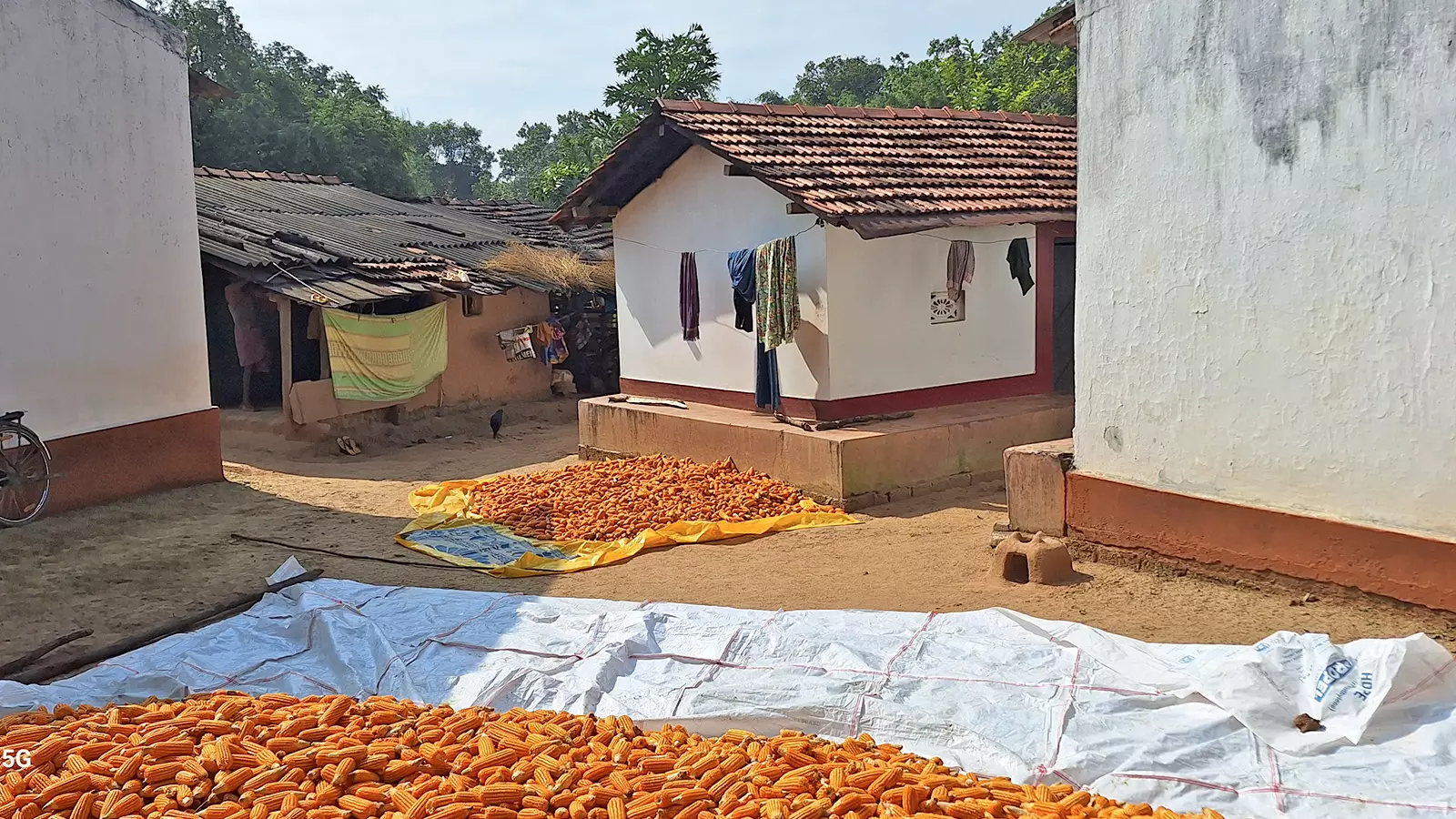
Corn is one of the main crops cultivated in Machkot. The villagers keep whatever they need for daily consumption and sell the rest at the market in Bastar. Photo: Puneet Nicholas Yadav
When asked if they had received any help from the state government against the Odia trespassers, in particular, and the struggles of their hard daily lives, in general, Domu’s reply was an intriguing mix of innocence and ignorance. “Government hasn’t done anything but van vibhag (forest department) is very helpful,” Domu said, nonchalantly dismissing Sandeep’s interjection about the van vibhag being a part of the state government.
Domu’s colleagues then went on to list the various schemes of the state’s Bhupesh Baghel-led government that the Machkot residents had benefitted from — higher MSP for agricultural and forest produce, grants for building new houses or refurbishing their old ones, cheaper electricity, admissions for their children in a government-run school that is located 15 kms away, etc — but insisting that these were all “done by the van vibhag, not the sarkar (government)”.
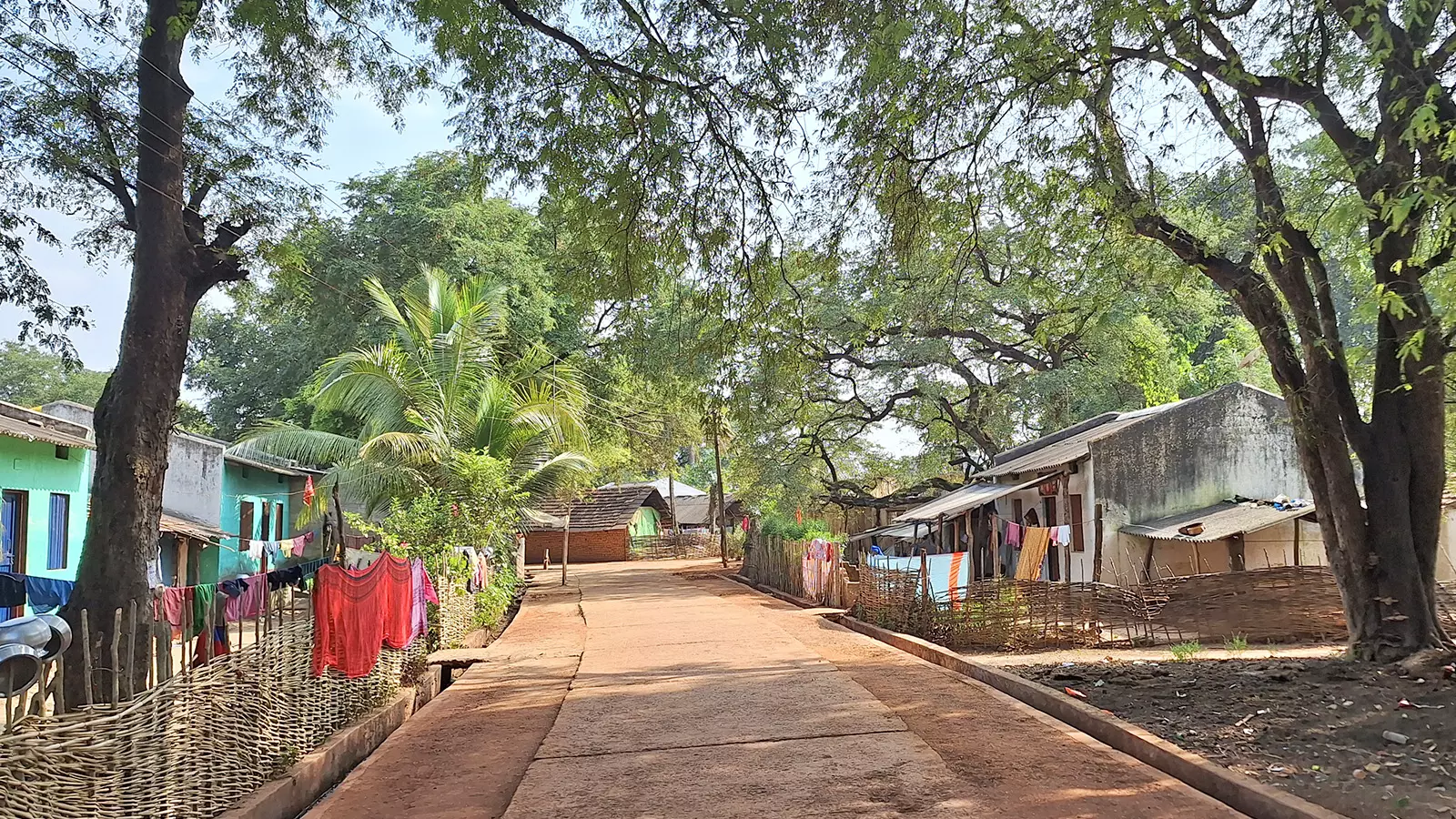
View of the Machkot village. The residents place special emphasis on cleanliness. It's hard to find any garbage lying around in the village. Photo: Puneet Nicholas Yadav
The team of guards also claimed that the forest department had, four years ago, given them a grant of Rs 1.5 crore, under a scheme they couldn’t remember, to spruce up their village and also helped them dig 11 bore wells across the village to ensure enough water supply for their farms. “We used the grant to repair our houses and some of us who had enough open space on our plots built new rooms also. The forest department also installed a solar panel in the village for electricity and built a hall where we can have our village meetings and other gatherings. We still have around Rs 55 lakh left from that Rs 1.5 crore in the samiti’s account,” Domu said.
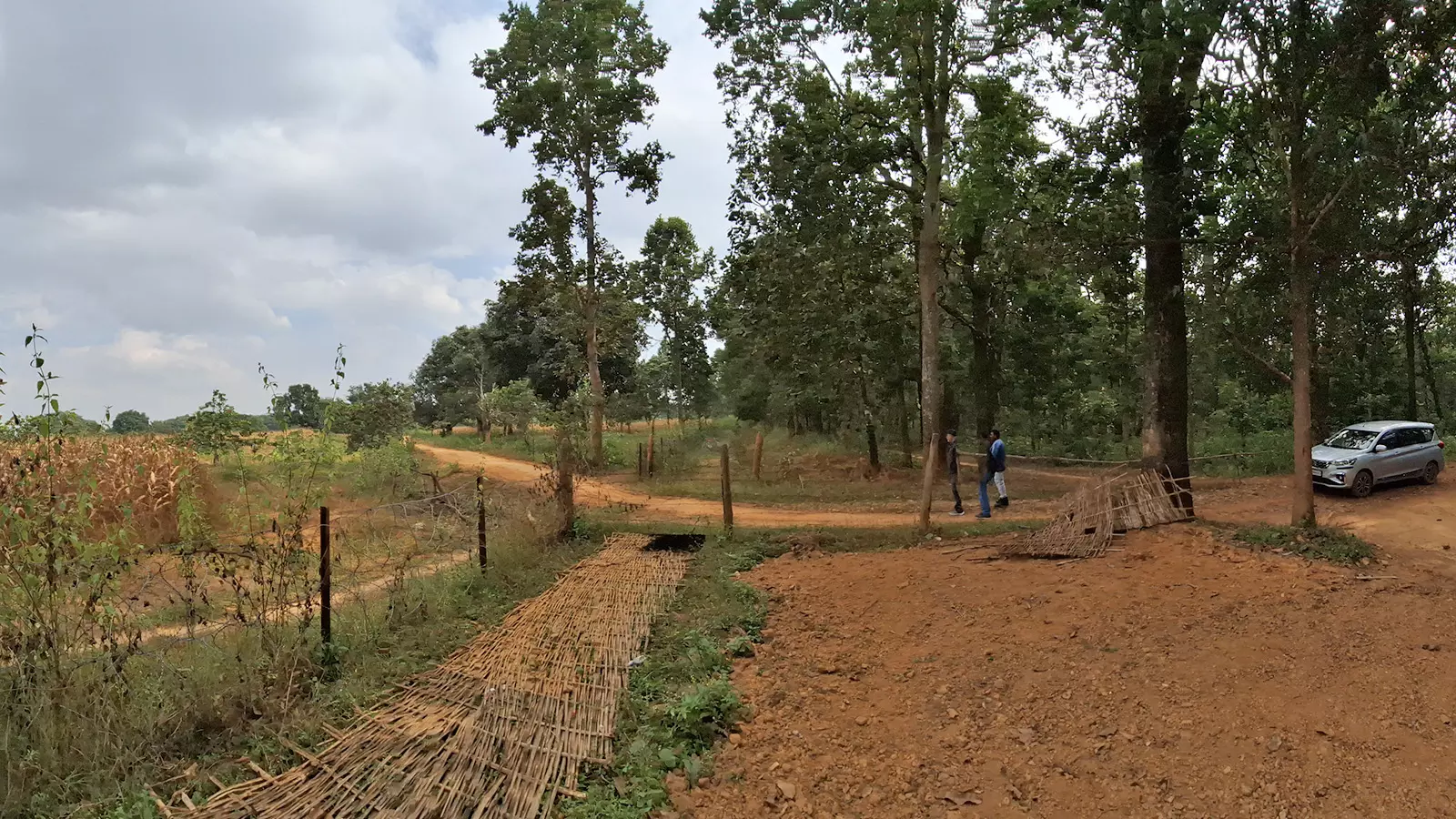
The border between Machkot and Machamal. Photo: Puneet Nicholas Yadav
Since Sal wood fetches a good price in the timber market, Machkot residents also earn from providing timber for auction to the forest department. “The forest department also gives us a percentage of the money it gets from sale of timber but we don’t cut the forest indiscriminately; we have about 1,700 hectares of forest, which we have divided in different patches. When we cut trees from one patch, we immediately replant new saplings. We cut one or at most two patches in a year, so that there is a gap of six to 12 years between planting and cutting and this way the forest is also not depleted. This is also why we have to keep our forest safe from the timber mafia coming from across the border,” Kamlu explained.
Given that Bastar is scheduled to vote for the assembly polls on November 7, inquiries on who Machkot would vote for were obvious. The answer, though, wasn’t. “No one has come here asking for our vote,” the samiti members said in near unison.
